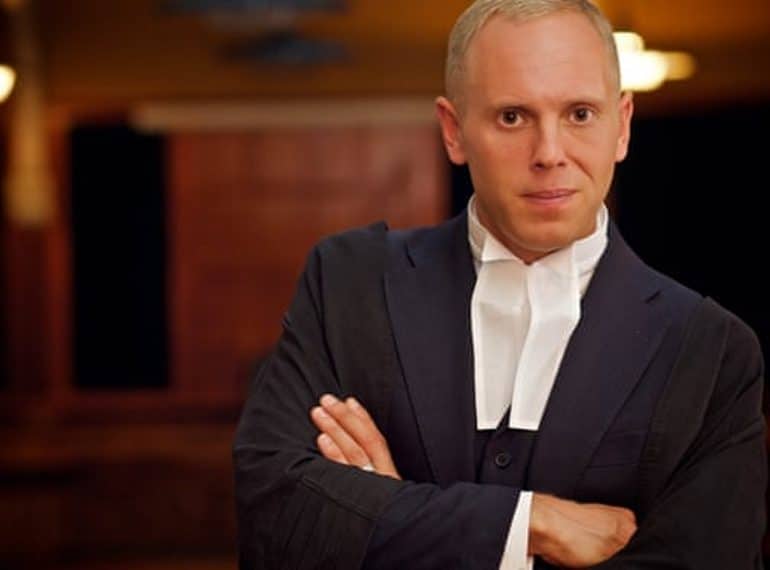Judge Rinder and QE

One of TV’s most extravagant personalities, Judge Rinder, has recently diversified into a new series dealing with real-life crimes.
In Judge Rinder’s Crime Stories, a new ten-programme series that finished earlier this month, Robert Rinder (OE 1989–1994) delved into cases which ranged from a couple duped by a surrogate mother to the murder of a young woman and a doorstep attack involving sulphuric acid.
It is less than two years since he first appeared on our screens with Judge Rinder – a daytime show portraying a fictional small-claims court where he presides over cases such as disputes over consumer issues, personal and business fall-outs and allegations of negligence. With its combination of hapless plaintiffs and the stream of acerbic comment from the bench, the show was an instant hit for ITV and for Robert, who, although not a judge, was already a very successful criminal barrister.
“I practiced for a decade and a half, doing very serious national and international criminal law, including lots of high-profile cases,” he told Alumni News.
The website of 2 Hare Court, his London barristers’ chambers, states that his practice focuses primarily on international fraud, money laundering and other forms of financial crime.
He was instructed by the British Government as counsel to the Turks and Caicos Islands’ Special Investigation and Prosecution Team, which was established by the Foreign Office to prosecute allegations of bribery, international corruption and fraud. In the UK he has advised on and appeared in cases involving fraud against the NHS, counterfeit medicines, multi-million-pound money laundering and pension fraud.
However, he by no means confined himself to financial cases. Robert was also regularly involved in murder cases and other cases of serious violence, usually appearing for the defence. These included the manslaughter of detainees in Iraq by British servicemen and the New Year’s murders of 17-year-old Letisha Shakespeare and 18-year-old Charlene Ellis in a drive-by shooting in Birmingham in 2003.
Indications of Robert’s talent for performance were clearly evident during his school years, demonstrated by his involvement in the drama club, which included title roles in productions such as Bugsy Malone, and involvement in dance at the School. At the age of 14, Robert was successful in securing a place at the National Youth Theatre – where he joined the likes of Matt Lucas and David Walliams and starred opposite a young Chiwetel Ejiofor in a production of Julius Caesar.
While reading Politics and History at Manchester University, he at first continued with his ambition to be an actor, and it was there that he met fellow student Benedict Cumberbatch. Although Robert abandoned acting and took up debating instead, he and Cumberbatch became fast friends. In 2013 Cumberbatch managed to have himself ordained so that he could officiate at Robert’s open-air wedding in Ibiza to Seth Cummings, a fellow barrister. And Robert was in turn one of Cumberbatch’s three best men when he married Sophie Hunter, the theatre and opera director and playwright.
Robert excelled in inter-varsity debates, winning international competitions, and in his studies: he gained a double-first, enabling him to achieve the rare feat of going straight from university into a pupillage in barristers’ chambers.
He enjoyed the law and built a successful practice in the years after he was called to the Bar in 2001.
But he found himself increasingly drawn to television. In his spare time, he dabbled in script-writing and pondered possible formats. And, in a serendipitous turn of events, when he pitched (unsuccessfully) to do an updated version of the 1970s drama series Crown Court, he came to the attention of ITV bosses who were looking for the right person to front a UK version of Judge Judy, the long-running and hugely successful US daytime show.
His courtroom show, with its gowns and gavel, has proved to be the perfect foil for Robert’s impressive intellect and innate theatricality. And while the gavel may not be an authentic element of a British courtroom, the law certainly is: he is proud of the show’s accuracy in all matters legal.
In a review of Judge Rinder for the Radio Times, journalist Michael Buerk wrote: “…he is very smart indeed…and often very, very funny. His grip on each case seems total. His ability to summarise, simplify, condense, can be a joy to watch. The way he rips gaily through the stumbling obfuscations is thoroughly entertaining, if cruelly one-sided.
“The programme’s real USP [Unique Selling Point], though, is that he doesn’t suffer fools gladly, and most of the people brought up before him are clearly complete idiots.” Among the more famous of his waspish comments are: “That’s what’s called a Pyrrhic victory. Look it up,” and: “There’s a lovely phrase and, let me tell you, in Darlington they talk of little else. It’s called caveat emptor,” and, to a bride in a dispute with a wedding photographer, “If you’d been at the Last Supper, you’d have asked for ketchup.”
Robert is clear on the lessons to be learnt from the show, such as the importance of putting things in writing: “Never trust people, always trust paper. I’d marry a piece of paper if I could.”
A fitness enthusiast, he has run marathons in New York, London and the Swiss Alps.
His book Rinder’s Rules: Make the Law Work For You! was published last October. It dispenses dos and don’ts on making complaints and looks at everyday legal issues.
It has been widely reported – though not yet confirmed – that he is to perform in this year’s Strictly Come Dancing, which is due to start in September.
